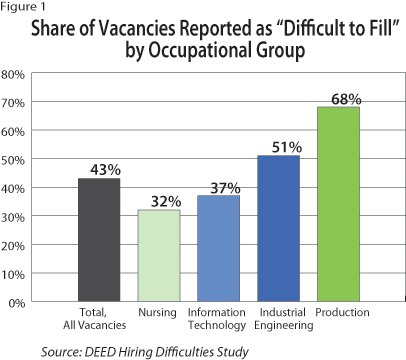
By Alessia Leibert
June 2013
DEED's Hiring Difficulties Study looks at select occupations to determine why employers may or may not be having difficulty filling open positions. The first round of the study last fall looked at six occupations.
In the latest round, employers were asked about their experiences filling jobs in information technology (IT). Previously, results were obtained for certain engineering, nursing and production occupations. Figure 1 shows the percentage of positions in those fields that were considered difficult to fill by employers.

Hiring difficulties impacted 37 percent of vacancies in IT occupations. The reasons for the difficulties were fairly equally split between those due exclusively to skills deficiencies (37 percent), exclusively to unattractive demand such as uncompetitive wages or other factors (32 percent), or a mix of skills deficiencies and unattractive demand (31 percent).
IT employers said the main supply-side problem was work experience and, importantly, the skills obtained through that experience. The following quotes from employers illustrate that point:
"The applicant pool … is often very small because people tend to have more of a general skill set compared to the specialized skill set that we need."
"It is hard to find people with mainframe skills [older skills like COBOL that are no longer taught]. Also, many people with skills aren't interested in working with older technologies."
"Low unemployment in the IT field creates a lot of competition, therefore — despite the huge response to the ads — we are not getting the right type of candidate. We are either getting candidates with too much experience [overqualified] or zero experience."
"We're looking for someone with specific technical skills and experience in Window Installer, Install, Shield, Visual Studio, and familiarity with image editing. We haven't been able to find anyone who has all of those."
The tendency to set stringent qualification requirements in the IT field is mainly the result of rapid technological changes and the proliferation of technological platforms that, once adopted by a firm, must be maintained by professionals with hyper-specialized knowledge or experience (Java versus .NET, for example).
As new IT graduates learn the most advanced technologies and seasoned employees trained in "niche" systems — or even in technologies that are becoming obsolete — start to retire, employers face the problem of maintaining legacy systems that new graduates might not have learned or might not be interested in working with compared to newer technological platforms. Sometimes, however, employers can deliberately set stringent qualification requirements because the candidate pool is large enough that they can be particular.
While formal education is often preferred, it is not generally considered absolutely necessary in IT. Fourteen percent of IT vacancies included in the survey required no formal education. Often, specific skill sets and previous work experience were more important to the employer than the degree of formal credentials. The most common degrees employers preferred were computer science or management information systems.
Where other issues besides skills mismatches were indicated, the primary challenges were non-competitive wages, low mobility of the workforce and lack of interest in the nature of the work. Strategies such as making IT workplaces more attractive to women, creating incentives for seasoned employees to stay with the firm, and producing career information that advises candidates on in-demand skill sets could be effective ways of addressing some of these problems.
More details about the study and its findings..
|
Survey Quick Facts for IT Occupations
|